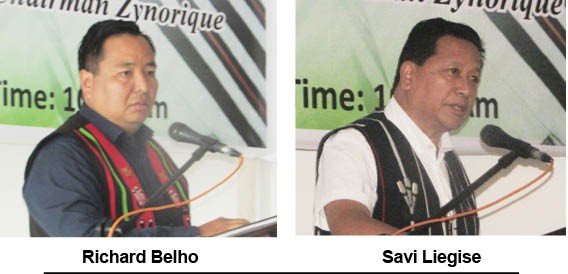
Our Correspondent
Kohima | May 18
The Angami Youth Organization (AYO) today organized one day discourse on demographic threats and economic sustainability vis-a-vis unemployment and self employment here at AMK Building, Kohima.
Hosted by Angamimiapfü Mechü Krotho, it was attended by representatives from every Angami frontal organisations, ranges and villages and concerned citizens. According to AYO, it was organized to address the pressing issues and challenges of random influx of illegal immigrants and the threats posing to the society.
Demographic threats
Talking on the topic “Demographic threats,” social worker Savi Liegise said that as per 2016 MHA report there were "20 million Bangladeshi immigrants staying illegally in India." Many of those were in Nagaland, he estimated.
He quoted agri department report that out of 23, 777 shops in the state, 17,055 shops are run by Non-Nagas, constituting 71.73%.
Touching on demographic impact on culture, Liegise said a culture with fertility rate of 1.3 is impossible to reverse or survive. He said that it takes 80-100 years to correct itself and there is no economic model that can sustain a culture in that period. As population shrinks, so does a culture, he said. “Save your culture. Save your people,” Liegiese said adding that it is the duty of the present generation to give a better future to the next generation.
In this context, he urged the people to come forward and tell the government to strictly enforce available laws to stop influx of illegal immigrants.
AYO president Neinguvotuo Krose said the massive illegal immigration poses a grave danger to our security, social harmony and economic well-being.
Unemployment & self employment
Talking on the topic “Unemployment and self employment,” Zynorique chairman Richard Belho said that the biggest threat to the Naga society is own attitude.
“We are either voluntarily unemployed or unemployable, we just have too many engagements and social activities to distract us,” he said.
Sometimes the hurdle to employment is education. “We are over educated and cannot stoop down to accept any job other than becoming government officer. Education should actually open our mind and enable clarity of thought. 20 years of education and ending up with no idea of how to be employed says that something is wrong in the educational system too,” Belho pointed out.
He said another problem with Nagaland is the Indo-Naga issue which is protracted for too long and put the whole society in a temporal suspense. “We are all caught in a waiting game and the only option for too long is government job. This has pushed us to total dependency on government fund and all our jubilee and celebrations have pushed us into becoming money worshippers. The donation culture is also paralyzing us,” Belho said.
This is a land of opportunity but what non local see as opportunity, we locals see it as hard work as we want easy money, he said.
Belho also stressed on the need to create community school for school dropouts to teach skills and farming.





